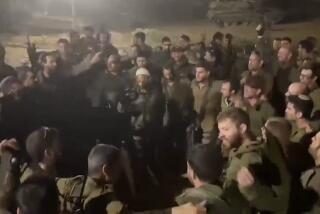U.S. Troops Reflect on Fallout From Scandal
- Share via
BAGHDAD — Army machine gunner Christian Kerlen was standing guard in one of Baghdad’s toughest neighborhoods when he first saw photos of U.S. soldiers abusing detainees at Abu Ghraib prison. The “messenger” was an Iraqi who handed him a local newspaper.
“I was like, wow, that’s great, that’s just great,” the 19-year-old private said sarcastically Saturday. “I don’t know what to think about them people that did it. It makes me think they got to go back to jail.”
As one of about 300 infantrymen posted at the Gunslinger Army base in the Adhamiya neighborhood, it’s Kerlen’s job to help keep the peace in one of the capital’s most violent Sunni Muslim enclaves, a city district once heavily populated by stalwarts of Saddam Hussein’s Baathist regime. But in a quarter where billboards and palace walls are tagged with anti-American graffiti, Kerlen worries that the abuse scandal will make peacekeeping tougher.
“It makes it a lot harder for us, because there are people who are going to stereotype us,” Kerlen said. “All of us are here to help the Iraqis, but some of us got carried away.... It’s probably going to make more enemies.”
Adhamiya is a patchwork of densely populated housing tracts and date palm groves flanking the east bank of the Tigris River. In the last month, insurgents have assaulted an Iraqi police station here, killed a South African security consultant and routinely harassed Kerlen’s unit with machine-gun fire and rocket-propelled grenades.
In recent weeks, the 3rd Battalion of the 153rd Infantry Regiment, an Arkansas National Guard unit attached to the 1st Cavalry Division, has begun several initiatives intended to present a friendlier face to Iraqis. But on Saturday, a day when base commanders held an audience with local tribal leaders and reopened a bridge, some U.S. soldiers wondered whether they had lost ground anyway because of the prison scandal.
“I still can’t believe U.S. soldiers did that. And what’s even harder to believe is that they took pictures. That’s stupid, and it’s wrong,” said Lt. Travis Goodwin, 29. “If it had happened to a U.S. soldier, we’d want some heads to roll.... I think they’re having the same reaction we’d have.”
But the battalion spokesman, Maj. Cary Shillcutt, said that most Iraqis have taken great personal risk to cooperate with the U.S. and would not be deterred by the disclosures of abuse. By the same token, he acknowledged, the news has not improved matters.
“To me, personally, I think Saddam did so many bad things, committed so many atrocities, that the images we saw don’t even compare,” Shillcutt said. “It was a tremendous blow dealt to us by these individuals, but it hasn’t really changed feelings here.”
Most soldiers in the unit are adjusting to living amid hostility in a foreign land, and choose not to dwell on the matter.
“You can drink a smoothie here, but you really can’t relax,” Shillcutt said. “This is not a forgiving environment.”
That view was echoed by some soldiers who say they’ve got little interest in the matter.
“I haven’t got to see the pictures, that’s just hearsay,” Cpl. William Thompson, 30, said. “I haven’t had time to watch the news.”
But Thompson said he has seen a shift in attitude among Adhamiya residents during the last month. Where once some would wave as he rolled past on patrol, the greetings were replaced by angry chants Friday at a demonstration that drew several thousand.
Two days ago, Spc. Nathan Ohnstad was assigned to direct traffic in the district. As he tried to impose order on the crush of battered jalopies that raced pell-mell through Baghdad streets, a sniper fired two shots at him from behind a tree. Ohnstad, however, said he saw no connection between the incident and the Abu Ghraib photographs.
“It hasn’t gotten in our way, I haven’t noticed anything different,” Ohnstad said. “I just do my job and keep my head down.”
More to Read
Sign up for Essential California
The most important California stories and recommendations in your inbox every morning.
You may occasionally receive promotional content from the Los Angeles Times.














